| Srl | Item |
| 1 |
ID:
185132


|
|
|
|
|
| Summary/Abstract |
The foreign policy of a nation is primarily determined by its national interest. India, in its foreign policy objective, tries to peruse an environment that suits its national interests. Undeniably, the underlying principles of its foreign policy is world peace, prosperity and establishment of a just, fair and ruled based world order. For India, the innermost circle of its foreign policy is Asia in general and its neighborhood pivotal. It was quite evident from Jawahar Lal Nehru’s Pan-Asianism approach. To him, India’s independence marked the rise of Asia. In fact, South Asia is India’s immediate neighborhood, from the geopolitical point of view it always remains as the core of India’s security.
|
|
|
|
|
|
|
|
|
|
|
|
|
|
|
|
| 2 |
ID:
136522
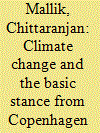

|
|
|
|
|
| Summary/Abstract |
Over the last five years, India and China have worked closely, as part of the BASIC (Brazil, South Africa, India and China) and the Like- Minded Developing Countries (LMDC) groups. The two countries have done so despite differences in their levels of economic growth and emission. The BASIC bloc is right in claiming the North for responsibility of global warming but it is true that China is undoubtedly growing fast and today is the world’s biggest emitter of green house gases.
|
|
|
|
|
|
|
|
|
|
|
|
|
|
|
|
| 3 |
ID:
119975
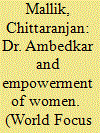

|
|
|
| 4 |
ID:
130165


|
|
|
|
|
| Publication |
2014.
|
| Summary/Abstract |
Gandhi was a strong critique of modernity. In his scheme of economy, production and technology there is room for machine but that would not replace human labour and concentration of power in the hands of few. He gave primary importance to simple technology over heavy industries. Simple technology can create mass employment, whereas advanced technology can lead to vast unemployment in a country like India. Thus, he preferred production by masses over mass production by heavy machinery. He wanted that appropriate technology and ideology should go together with culture of self-control. He believed in eco-humanism and integral development of men and a decentralized socio-economic, political order at the grassroots under people's direct control. He strived for an alternative practice, which was trusteeship and that was distinctly local or relevant to specific contexts. Trusteeship alone could bring about the regeneration of India society.
|
|
|
|
|
|
|
|
|
|
|
|
|
|
|
|
| 5 |
ID:
186258
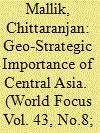

|
|
|
|
|
| Summary/Abstract |
Though, Central Asian Republics are predominately Muslim populated, yet these countries support ideals of
multiethnicity, rationality and secularism. India’s relationships with the Central Asian Republics are based on a unique model of political, economic, cultural and developmental partnership. New Delhi stands for a deep, meaningful and sustained engagement with Central Asia. Geostrategically, India is an important stakeholder in the stability of Afghanistan which is a bridge between Central Asia and South Asia.
|
|
|
|
|
|
|
|
|
|
|
|
|
|
|
|
| 6 |
ID:
169817
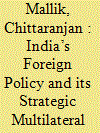

|
|
|
|
|
| Summary/Abstract |
We are living in a well-connected and interdependent multi-polar world where multiple powers are competing and cooperating with each other. It is widely believed today that the centre of gravity in the world politics is shifting away from the west to south emerging powers and India is now a leading global power. Given its status as the world’s largest democracy, India’s rise as a power on the global stage has increasingly drawn global attention. Instead of focusing on great power competition, India kept itself more relevant in the international community by reshaping its foreign policy according to the changing global scenario, and embedded in reform of global governance.
|
|
|
|
|
|
|
|
|
|
|
|
|
|
|
|
| 7 |
ID:
189619
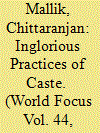

|
|
|
|
|
| Summary/Abstract |
Ambedkar wrote that caste will cease to be an operational force only when inter-dining and inter-marriage have become matters of common course. A large majority of Hindus do not inter-dine and inter-marry, because inter-dining and inter-marriage are repugnant to their beliefs and dogmas which the Hindus regard as sacred. He argued, ‘caste is a notion, it is a state of mind. The destruction of caste does not therefore mean the destruction of a physical barrier. It means a notional change.
|
|
|
|
|
|
|
|
|
|
|
|
|
|
|
|
| 8 |
ID:
163034


|
|
|
|
|
| Summary/Abstract |
Subhas Chandra Bose, popularly known as ‘Netaji, was strikingly a great patriot, a remarkable revolutionary and one of the chief architects of India’s freedom movement who made supreme sacrifice of his life for India’s freedom.
|
|
|
|
|
|
|
|
|
|
|
|
|
|
|
|
| 9 |
ID:
136834


|
|
|
|
|
| Summary/Abstract |
Dr.Ambedkar a great intellectual, statesman, erudite scholar, institution-builder, socio-economic theorist and considered as one of the illustrious political personalities of modern India. He was also a great radical reformer and above all the liberator and saviour of the untouchables and backward class people of India. He initiated social revolution and secured social justice for those who had been denied basic rights of human beings for thousands of years.
|
|
|
|
|
|
|
|
|
|
|
|
|
|
|
|
| 10 |
ID:
152637
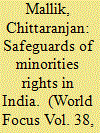

|
|
|
|
|
| Summary/Abstract |
The issue of minority is a universal phenomenon. There is no country in the world without having presence of some kind of minority. Yet, the nature of minority, the relationship between minority and majority in the majoritarian democracy and the problems of minorities are different from time to time, region to region and from country to country.
|
|
|
|
|
|
|
|
|
|
|
|
|
|
|
|
| 11 |
ID:
158240
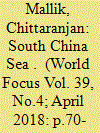

|
|
|
|
|
| Summary/Abstract |
The Asia-Pacific region depicts fragmented physical character in the form of peninsulas and several thousands of islands of varied dimensions and shapes, this entire Asia-pacific Realm reckoned a strategically pre-eminent zone on accounts of its being intersected by international sea-lanes and air routes.
|
|
|
|
|
|
|
|
|
|
|
|
|
|
|
|